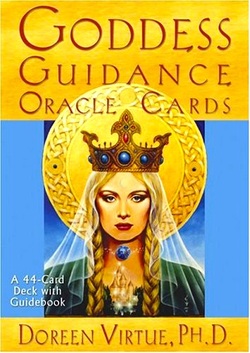 I have a confession to make, and it's one I've been putting off for a long time.
I've been experimenting...
With oracle cards.
The Doreen Virtue Goddess Guidance cards, to be specific, with the sparkly gold edges the pretty, soothing pictures of gorgeous women. The sweet, "non-threatening" messages.
And okay, okay, I jest. There is nothing wrong with oracle cards - they're lovely! And fascinating! There's so much variety! But I was always a bit skeptical about Ms. Virtue. Not because she's doing it wrong - no one is doing it wrong. But I didn't know if she was for me.
I don't know if I believe in Indigo children, you see. Angels and faeries do incredible things for some people, magickally and spiritually - I've met just as many people who say these are powerful forces you don't want to mess with idly. (I've got no idea how they got such a different set of references.) And then there's Doreen Virtue's Tarot deck, in which she claimed she'd removed anything "threatening" or "scary" - when really, the only thing scary about Tarot is how it might tell you there's things in your life that need a little work. Why would I want to avoid anything that might tell me the truth?
But I kept running into these cards, over and over again. Different readers would pull them to supplement a reading. They were out for display at my favorite occult shop, and I couldn't stop staring at them. And finally, a financial windfall came my way to treat myself to some Amazon goodies, and I put them on the order list.
What strikes me first about these cards is the artwork. It's so lush and also so varied, in different styles and forms of expression that let you really feel the personality of each goddess as the cards express them. You could use these cards meditatively if you like, delving into the details of each image and seeing what stands out to you. Or you could just treat the goddess in each card as a friend and a guide, as the deck encourages you to do. That'd trouble you, obviously, if you come from a faith that views these figures as literal beings who want to be called on and honored in a specific way, but as I'm more from the "facets of the same diamond" camp, I see the cards as having a unique energy that they bring with each individual message.
In general, oracle cards tend to be more specific than Tarot, more on point. That doesn't allow for a reading of more than a few cards, and it doesn't delve into complexity, but it provides an excellent springboard for deeper work. Reflecting on the energy of a single card can provide a lot of journal fodder, or maybe researching the nature of that goddess beyond the surface, learning the deeper aspects of her particular message. (I do wish the guidebook provided a little more insight into each individual goddess, and the legends that informed her message.)
There really is a lot of variety for "gentle, non-threatening" messages. Ishtar encourages you to set healthy boundaries, and Green Tara tells you that this may be a time to avoid harsh situations or environments. Kwan Yin tells you to be compassionate towards others, but most of all towards yourself. I realized very quickly that giving yourself kind, careful messages doesn't always mean avoiding truths. Certainly a few daily draws have already given me a lot of food for thought. But much like Tarot, it's up to me how deep I choose to go, whether I do the reflective work on what a particular card might mean to me. That provides a bit of extra responsibility on the part of the seeker, but I can't think of anything less coddling than that.
While Tarot's definitely my one true love as far as divination's concerned, I think I can count this experiment a success.
A Note From Kim: With my life coaching certification complete, I'm now available for free discovery sessions, one-time deep exploration, and monthly packages! To celebrate, have a look at this great little video from Tim Brownson (adaringadventure.com), who gives some great pieces of advice for all of us. We're all our own coaches first and foremost!
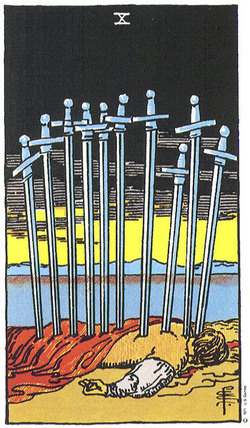 Have you ever encountered something that just makes your eye start twitching and your fingers start drumming? The kind of thing where no matter how much you try to practice non-judgmental bliss, it can sometimes just get to you? Here are a few things I've seen in Tarot that get under my skin.
1. "Gypsy" fortune teller acts. First of all, "Gypsy" is actually a really insensitive word. A lot of people don't know this, so don't feel horrible if you used it up to now or anything. But it's a big-time slur in Europe, and it isn't even accurate, considering it was used to refer to the Romani people because they "looked Egyptian" and no one could be bothered to ask them for the facts. Kind of like "Indians" referring to Native peoples in North America.
The actual semantics aside, if you're reading Tarot more for the entertainment than the counseling angle - and that is totally fine, seriously, as long as you make it clear that's what it is - then you can probably find a sparkly costume to do it in without an accent and the words "cross my palm with silver." Come on, guys. There are like six stereotypes that plays on, and not enough people know what they really refer to.
2. "Bad" cards. People who are reading for themselves tend to do this. A reversal is "bad". The high Swords cards or the Tower are "scary". The Star in the "what to watch out for" position means "you are heretofore advised to throw yourself into a pit of despair and never be optimistic again."
You can read everything super-literally if you want, and I get it if you want the cards to just serve up a slice of truth: "No, the job probably isn't on the way. And also you should probably look out for the bolt of lightning that's going to shake your world up. Just warning you." But I feel like I'm watching a mime box himself in. The problem isn't how you're reading, when you do it this way, it's how you're responding to what it says. I honestly can't, in my heart of hearts, believe your inner guidance and a hand from the Universe is simply saying "Your life will suck right now."
Why is there going to be a bolt from the blue, or a feeling of total despair? You're never helpless in your life, and rarely does anything just happen to you, so determine what's going to show up in your world and decide how you want to feel about that. Adjust circumstances accordingly. Maybe you're not supposed to get the job because there's a better one on the way. Or the sudden, painful revelation will lead to you reinventing your world in a way you'd never have been able to before. Tarot is never just about things happening to you. It's about looking at the road you're on, where it's leading, and if you want to change direction.
3. "They're doing it wrong!" Yes, before you ask, I see the irony here. But seriously, I can't stress this enough. Yes, there are close-minded ways of catering your reading to exactly what you want to hear, or responding to your reading from a place of fear. And that's not good for your learning, or what you get out of reading Tarot. But I'm talking about the methods you pick up and the teachers you choose. There is no end-all-and-be-all as far as that's concerned. The only way you could possibly be "doing it wrong" is if you learn one way, stop there, and refuse to learn anything else. The more information you gather, the more you can decide for yourself what's worth doing and how.
But, here's the real reason for this one: even if you work for years and decide the best way to learn or teach or read the cards or whatever else, please don't be a jerk about it. I have seen a few Tarot experts and instructors call each other out, often by name. I've seen them get judge-y for having a different opinion, teachinga certain way, charging a certain amount of money. I can't think of anything that turned me off faster than watching a seminar from an instructor, and listening to them smugly outline how their teaching was superior to someone else's book.
Everyone learns differently. Everyone responds to the cards differently. Don't limit yourself by stereotypes, by fear, or by inaction. But most of all, don't ever limit someone else by telling them there's only one way to tap into the cards. Tarot is far too elaborate, magical, and full of potential for that.
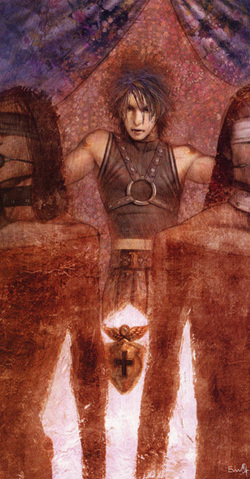 "Absolute power corrupts absolutely."
"The power of man has grown in every sphere, except over himself."
"If you want to test the mettle of a man, give him power."
When you're trying to grow anything of your own - confidence, creativity, self-love or self-discipline - power eventually comes up. What has power over you? What do you have power over, and what should you be able to control?
We're taught, probably for a good reason, to be afraid of having too much power over the world around us. After all, will we really know how to use it wisely? Will we wind up becoming one more person in a long line of bullies, acting only in our self-interests? Or are there institutions that have had power over us for too long, and is this the only way to make a stand?
The Tarot has a lot of cards about power, and in writing my upcoming course, I was surprised at how much crossover there was in just the first six. There's the Magician, who is a magical student, adept, or a stage magician and a shyster depending on who you ask. There's the Emperor, a ruler of men, and the Heirophant, a ruler of our traditions and institutions.
That's to say nothing of the cards that come later, such as the Chariot and Strength, who in many decks come right after each other. To me that's the story of "hard control" vs "soft control", of the times you have to take life by the reins and steer, the times you have to gently tame your inner beasts and demons. It's the Chariot I decided to put up as an illustration for just that reason. And wouldn't you know, my randomizer selected the Lunatic Tarot by Evan Yi Feng. It's one of the first decks I've ever seen where the charioteer isn't pulling horses, or a dark and light Sphinx, but instead is in command of human beings. That's scary - but the beauty of it is when you take a look at that illustration, if it's drawn in your reading, and say "am I exercising control or abuse of a situation?"
There are so many ways to use power, so many ways to define what it even is or where it belongs. That's why to me, power itself isn't a dirty word. We're afraid to call ourselves powerful, to say we have any kind of control. We think it'll make us scary, selfish, or egotistical. But if you don't have power over anything, ultimately it has power over you. You lose any kind of hold you might have over your own life, or the life you want to make for yourself.
"With great power comes great responsibility." And if you don't acknowledge your potential for power, you don't take responsibility for what's happening around you. The beauty of the Major Arcana is that we've been all its figures at one point, or will be someday. We've taken charge or been stuck in tradition, we've fought our problems with gentle grace or by reigning them in. If you don't like the role you see yourself playing, you can understand the part it's playing in your life, and make the choice to transform into another.
And that's the ultimate power over, and responsibility for, your own life. So who will you decide to be today?
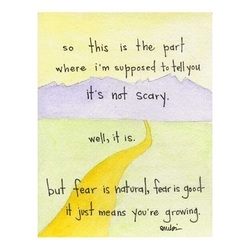 (image and words from pinwheeldesigns @ Etsy)Putting on the beginnings of a life-coaching hat right now: I'm thinking a lot about fear today. I just finished my life coaching certification, which I'll soon combine with an MSW in social work to offer life coaching sessions with an added Tarot twist. I'm in the editing stages of my first course, Tarot Journeys: Of Mentors and Magic Wands.
It's a lot of new, and a lot of unexplored. And that fear thing? Pretty inevitable.
It's hard, sometimes, to figure out why we're afraid. We're taught, of course, to understand fear of failure and getting hurt. It's pretty easy to figure those out. Imagine the worst-case scenario you can think of for whatever's freaking you out. Failure, rejection, living alone with ten cats - whatever the opposite of your priorities are I guarantee you can come up with at least one scenario, probably more. Even when you're sure you've accounted for everything twice and you know your presentation is going to rock, there's still that little voice in the back of your mind, the one even professional performers and speakers get, that asks "what if it doesn't?"
Fear of success - that's harder. That's usually hiding, and it's one we have to really think about to understand. Imagine yourself doing fantastically. Meeting your goals to the letter. Having everything you ever dreamed. Does that freak you out, because then you have to continue to perform? Then you have a commitment? Yeah, I hear that. Whether you fear being tied down, or you think you have to continue to meet expectations, we don't talk about fear of doing well - but it's there.
Here's the secret: fear is one of the best gifts your soul can give you. When something is scary, you know you're stumbling on something big, something important. When it's scary, it means it's not easy. It also means that it matters. Never, ever let fear keep you from doing the work.
When something feels overwhelming, I try doing something that feels paradoxical but has the ability to really work. Break down what you're scared of into smaller and smaller steps. If it feels overwhelming, looking at the individual parts is a good series of signposts for progress being made. "Social media marketing plan" sounds overwhelming and staggering. "Blog today and post to Twitter and Facebook about it" doesn't sound so hard. Once that goes well, you can continue to add further steps.
Conversely, don't be afraid to focus on the big picture. Not on the staggering, overwhelming one - the one where you know you'll reach your goal. Don't imagine what comes next. Imagine what you're doing it for in the first place. Imagine fitting into the bikini when the weight is lost, having enough money to take a vacation, the sense of satisfaction you'll have from completing something big and scary. Let that be your endgame, the goal you have in sight, when you start to forget why you're doing this and feel the temptation to give up.
Thank you SO much to all of you who've visited, signed up for the list, and left comments. I promise I'll be getting to each of you individually, because I love hearing from everyone!
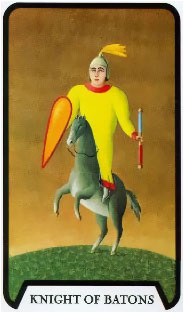 For this week I think I'm going to bring back something I haven't done in a while - a weekly card draw to provide a focus for the week. There are a ton of Tarot blogs out there that give you a daily drawn card, so I'm going to give it a little twist - not only am I going to be waxing melodic on one card each week, I also have a list of random scanned decks I'm going to pick from, to give a different flavor to the cards. I really love looking at different decks, comparing the artistic choices made and seeing what each interpretation says about the card drawn. And comparing Tarot art is a great way to keep your readings fresh and full of variety.
This week we have (ack!) a court card, the Knight of Wands from the Tarot of the Witches by Fergus Hall. There's really no good reason to call this Tarot of the Witches, because it has pretty much nothing to do with witchcraft save the stereotype that you have to be witchy to use Tarot. If anything, you're probably going to recognize this deck from the James Bond movie Live and Let Die, where it was featured, probably with no small detail spared for accuracy. (That was sarcasm, if the lack of tone made you confused for a second.)
I've seen people call this deck the ugliest they've ever seen. I have no idea why, honestly. It's surreal and out of proportion, but so is Picasso. I don't know why the same dark-haired gentleman seems to feature in every card, as if he's just changing his wardrobe, but that's a style choice to me. The deck might not be the best first pick for a novice, but it strikes me as a fun piece of work I might want to add to my collection, and to use with clients if I'm feeling "mysterious" that day. There definitely is an aura of the otherworldly to it.
The similar format to all the images does make it a little hard to look at this card from an artistic level. But one thing that stands out to me with all the Knight cards in this deck is the way they're a bit top-heavy, rounded in the shoulders and barreled in the chest, a little too big for their horses. I first learned the court cards through Joan Bunning, who actually made the Knights the easiest to learn. They're the unstable teenagers of the court cards, the best and worst extremes of the things their suits embody. A Knight of Wands type is someone very fiery, passionate, and take-charge who hasn't yet learned to balance that energy. Often they tend to be quick on the draw, have a strong temper, or go up in flames. A "top-heavy" and off-balance Knight only seems appropriate.
For this week, look at how you view your passions. Do you have an all-or-nothing sort of stance about the things you love? Do you put too much energy in and burn yourself out? Have you not been careful with your passions, and gotten yourself in trouble? Take a good long look, and think about how you'd direct your energy in an ideal world of your own making.
I know I stress a lot about Tarot being a tool with no one right method, and how the magic is in you. Today I thought I'd put up a really great YouTube video I found by Jeanne Fiorini of TarotWorks.com, who talks about some of the traditions and superstitions behind Tarot - and how really, like I keep emphasizing, it's a set of tools meant to bring out your inner wisdom.
 When I was searching through Tarot articles for new information to share with you guys, I stumbled on something that really made me twitchy. In one article geared towards learning to read the cards for beginners, I saw an author saying it might be too confusing for a beginner to read multiple books on the cards, because it might lead to conflicting meanings.
And my first thought was: so what?
Here's the thing about Tarot meanings - they evolve, based on the reader, the deck, the author, the school of thought, the time of the writing. Saying that "conflicting ideas" will confuse you is like saying there's a right answer in the first place. But worst of all, it's like saying you can know too much.
I'm a bookworm and, showing my nerdy roots again, a Ravenclaw at heart. I can't think of anything you could possibly read too much on. You should always, always strive to learn as much as possible - or you'll get locked into one meaning, and unable to be flexible when the need serves. When you're reading for yourself or for someone else, you'll find a meaning for the cards that just doesn't fit the rest of the reading, unless you're willing to think outside the box a little bit or go with your gut. Saying that's "too confusing" is like assuming you can't think hard enough to read the cards in the first place.
There are things to watch out for, of course. Don't scatter your energies and try to tackle too many books at once without absorbing all of them. Don't take anything as gospel without examining why one author feels one way, and another might feel a different way. Don't fail to recognize real, historical facts, because Tarot's genuine evidence-based history shows a lot about where it came from and helps you appreciate how it evolved.
But there's never too much information. There are only ineffective ways of absorbing it.
A Note From Kim: Hey, guys! When you search for articles already created about Tarot, there really isn't a lot anyone's saying that's new. But I do really like this article for outlining some of the pros and cons of online Tarot reading, with automated apps like facade.com, tarot.com, and iPhone apps. There's definitely a mystique you can't get anywhere else except a sit-down reading from a professional, but online Tarot readings are a great way to start learning about the cards, and exploring different decks, spreads, and meanings.
There are many online tarot card reading tools available right now. Some are browser or flash-based, while some can be downloaded. Many psychic tarot reading websites offer free programs that let users pick out random cards from a deck for simple yes-or-no readings. Shuffling the cards prior to the reading is also possible using software. In the past, you could only depend on a fortune-teller to interpret the card spread that you created by picking out cards from a tarot deck. But not anymore. Things changed when tarot books became available in the mainstream market. It's easy! Simply purchase your own tarot deck and get the guidebook as reference for tarot card readings. With the advent of the digital age, purchasing actual cards became unnecessary because a person can do tarot reading using computer programs. Technology can do wonders, even for the arcane arts. What are the advantages and disadvantages of using an automated tarot card reader?Advantages- It's no longer necessary to buy cards because a digital counterpart is available at the click of a button. Tarot cards are great to have, but the good ones can be pricey. Moreover, the tarot references you will use to interpret the cards, as well as the accessories you will need to store your cards properly, can add to the cost of the deck. Doing a reading using digital cards can be more economical than buying your own deck. The best computer programs for reading tarot show the meanings of the cards when you point your cursor on one particular card, which means you don't need to buy the guidebook or take notes. - It's convenient. You can do tarot predictions anywhere as long as you have the program installed in your laptop, or you have the tarot card reader link bookmarked on your browser. Some applications are made especially for the iPhone and iPad, which means you don't even have to bring your netbook or laptop with you if you're planning on doing a reading for a few friends. - Do-it-yourself tarot reading made simple. An online reader or a do-it-yourself tarot software can be perfect for simple spreads like the three-card one that answers a yes or no question quickly. You do not need to open your tarot guidebook if you want to know the meaning of a particular card. Just point and click. Disadvantages- Limited number of spreads. Some of the best card spreads need more cards to complete the reading. This is easy to do if you're using actual tarot cards and you have a big table in front of you. In fact, you can expand some of the traditional ones like the Zodiac horoscope spread and the Celtic cross if you have the actual cards at your disposal. - Random selection may be off. Even if you're not one to distrust any form of technology or computer application, you know that a software can be manipulated by a skilled programmer to show a particular card more often than the others. Randomness of card selection can only be obtained if you are holding a deck of cards and shuffling it yourself. - An online reading can be less interesting than an actual reading. Part of the reason why people love tarot card readings is that they can set up a formal table and meditate while using the cards. There's not much opportunity to do this on an ordinary day, especially if you're a busy person. Actual horoscopes tarot readings can relax you because they normally include lighting a scented candle, putting on soft music and sitting away from your computer station at home. If you're using online tarot card reading tools regularly, it's only a matter of time before you start missing the experience of holding and using tarot cards. For the absolute best information on how to learn to read tarot cards, including tips, tricks, and the best strategies visit Stacey's website at http://www.tarotcardreadings.co. Here you will find the best information specifically for those interested in Tarot like yourself! Another great resource is http://www.tarotcardreadings.co/learn-tarot-online/ which is a course that shows how to read tarot cards online. Article Source: http://EzineArticles.com/?expert=Stacy_RenaArticle Source: http://EzineArticles.com/5491650
|






 RSS Feed
RSS Feed

